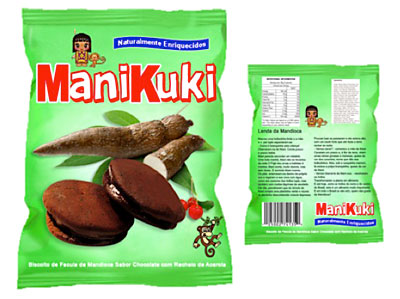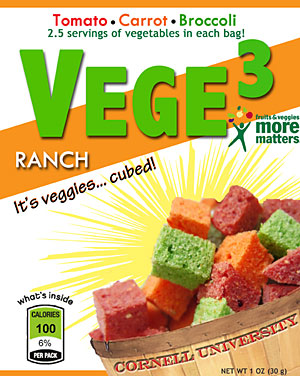Students take top prize for developing cassava cookies for poor nations
By Bethany Liebig

A group of food science students have developed a tasty way to address the problem of iron deficiency in developing countries: cassava cookies.
The team of 13 aspiring food scientists from Cornell beat out 28 other teams to take first place in an international product development competition at the Institute of Food Technologists (IFT) Annual Meeting, held June 11-14 in New Orleans.
Their concept, entered in the Developing Solutions for Developing Countries Competition, was to make an iron-fortified product suitable for school lunch programs in a poor area of Brazil, where half the population lacks adequate iron and cassava is a major food staple.
They spent nine months on the MandiMais project, which translates to "Give me more!" in Portuguese. As part of it, they created a cookie called ManiKuki, which is naturally fortified with iron-rich cassava leaf protein concentrate and stuffed with an acerola filling. The acerola, a local fruit high in vitamin C, not only adds flavor, but also helps maximize iron uptake from the cookies.
Targeted to children ages 7-10, ManiKuki provides 22 percent of the daily recommended iron intake and 250 percent of vitamin C, with just 100 calories per serving.
Cassava is a potatolike crop that thrives in poor soil and can survive with little water. More than 500 million people worldwide consume products made from cassava tubers as their main source of calories every day.
Its roots and leaves contain compounds that break down to cyanide when consumed, so the students' first challenge was to work with collaborators from Universidade Federal do Para to develop a process for detoxifying the raw leaves and tubers. They then combined the leaves and cassava starch, which is already produced locally.
"Using 100 percent local sources makes this product self-sustaining," said doctoral student Sana Mujahid, who led the team with Diane Schmitt '11 and Ph.D. student Luciana Pereira e Ferreira.

ManiKuki may one day be available to children for just 16 cents per child per day through a Brazilian school meal program.
Mujahid said the project could also provide additional income to smallholder farmers, and there is potential for applications in other countries and for other products, such as bread.
In the Product Development Competition, another group of 15 Cornell food science students, led by graduate students Mark Nisbet and Dongjun Zhao, took home second prize for Vege3, a nutritious freeze-dried, crunchy vegetable snack with the flavor of tomatoes, carrots and broccoli in ranch dressing. A serving provides the equivalent of 2.5 servings of vegetables, 4 grams of fiber, 0.5 grams of fat as well protein, vitamins A and C, iron and calcium -- with only 100 calories.
"You can eat the entire bag and actually feel good about it," Nisbet said.
The students wanted to create a convenient, shelf-stable, tasty product that would encourage Americans to eat more vegetables.
"This is what food science is all about -- using our knowledge to create a product that improves the quality and safety of people's lives," Zhao added.
"The competition in these two competitions was fierce, and our students did an outstanding job. We are very proud of how well they represented Cornell at the meeting this year," said Dennis Miller, food science department chair.
The Department of Food Science also had several faculty delegates and presenters at the conference, which was led by Professor Robert Gravani, president of the IFT. Malcolm Bourne received the IFT's highest honor, the Nicholas Appert Award, and Rui Hai Liu received the prestigious Babcock-Hart Award. Dominique Sinopoli won second place in the Undergraduate Research Paper Competition, and five graduate students were finalists in the graduate paper competitions.
Bethany Liebig '12 is a writer intern at the College of Agriculture and Life Sciences.
Media Contact
Get Cornell news delivered right to your inbox.
Subscribe